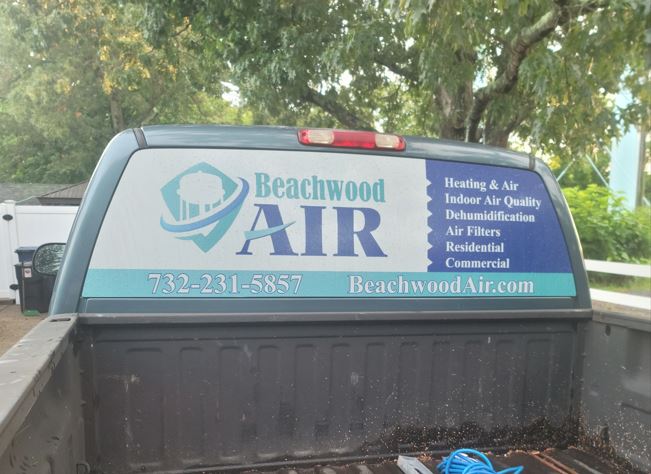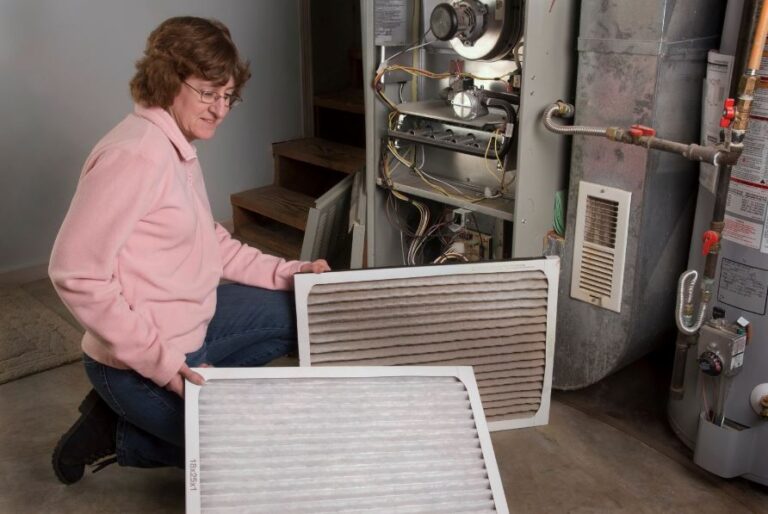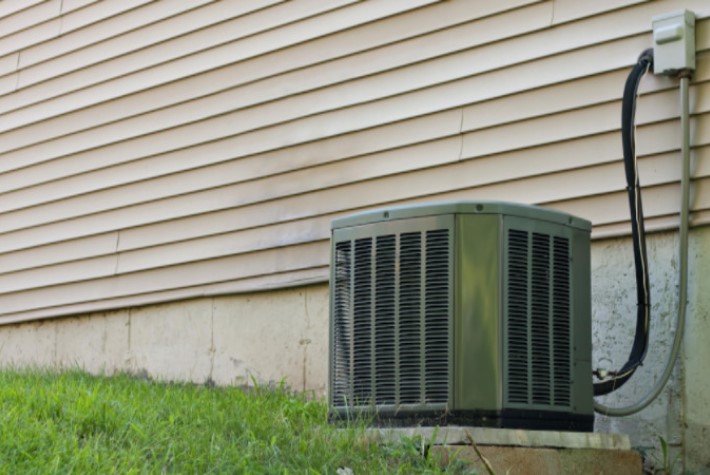
As a New Jersey homeowner, it’s important to regularly maintain your HVAC system to ensure its optimal performance. One issue that you may encounter with your HVAC system is a coolant leak. This can lead to various problems such as inadequate cooling and higher energy bills.
But how do you know if your air conditioner has a coolant leak? Let’s talk about the signs and symptoms of a coolant leak and how to detect it using Beachwood Air’s state-of-the-art equipment. By understanding these indicators, you can take necessary actions to address the issue and prevent further damage to your HVAC system.
What is a Coolant Leak?
A coolant leak in your HVAC system refers to the loss of refrigerant, which is responsible for cooling the air that circulates inside your home. Freon is the refrigerant commonly used in household hvac systems. The Freons are colorless, odorless, nonflammable, noncorrosive gases or liquids that were introduced as refrigerants in the 1930s. Freon is also known as coolant and is a chemical substance used in air conditioners and heat pumps to absorb heat from indoor air and release it outside. Without enough refrigerant, your HVAC unit will struggle to maintain a comfortable temperature in your home, resulting in inadequate cooling and increasing your energy bills.
Coolant leaks are a common problem that can happen for various reasons, such as wear and tear on the system’s components or damage to the refrigerant lines. Address coolant leaks promptly as they can lead to more significant issues like compressor failure, which can be costly to repair.
Also, coolant leaks can be harmful to the environment. The refrigerant used in HVAC systems contains chemicals called hydrochlorofluorocarbons (HCFCs). This is why it’s important to detect and fix any coolant leaks in your HVAC system as soon as possible.
Common Non-Leak Issues Affecting Cooling Efficiency
First let’s explore the non-leak issues that can affect the efficiency of your HVAC system. There are Non-Leak Issues that can affect the performance of your air conditioning system and require a call to an HVAC service like Beachwood Air to come in for an AC repair. One common issue is dirty coils. When the coils are not cleaned properly or frequently enough, it can cause low airflow which in turn leads to low operating pressures and an inefficient cooling process.
When the coils are dirty it can also cause the system to work harder and use more energy to achieve the desired temperature. This not only leads to higher utility bills but also puts a strain on the system which can lead to premature wear and tear.
It is important to regularly inspect and maintain your air conditioning system to ensure that the coils are clean and there is proper airflow. This can be done through simple tasks such as regularly changing air filters and scheduling professional maintenance check-ups.
One effective way to clean coils is by using a coil cleaner solution, which can be applied and then rinsed off with water. It is important to follow the manufacturer’s instructions when using these solutions to avoid any potential damage to the system.
Another non-leak issue that can affect cooling efficiency is a malfunctioning thermostat. If the thermostat is not calibrated correctly or has faulty wiring, it can cause the system to run longer than necessary and waste energy. It is important to regularly check and calibrate your thermostat to ensure it is functioning properly.
These are just some of the non-leak issues that can affect the performance of your air conditioning system. Regular inspections and maintenance, along with proper cleaning of coils and calibration of thermostats, are key to keeping your system running efficiently and preventing any potential problems from arising.
Recognizing Signs and Symptoms of a Coolant Leak
Freon leaks can significantly impact the cooling efficiency of your system and lead to further damage if left untreated.
One of the most obvious indicators of a coolant leak is reduced cooling in your home or building. A coolant leak in your HVAC system can greatly affect its cooling efficiency and may result in higher energy bills, discomfort, and potential damage to the unit if left unchecked. It is important for homeowners to be aware of signs and symptoms indicating a possible coolant leak so that they can proactively address the issue before it worsens.
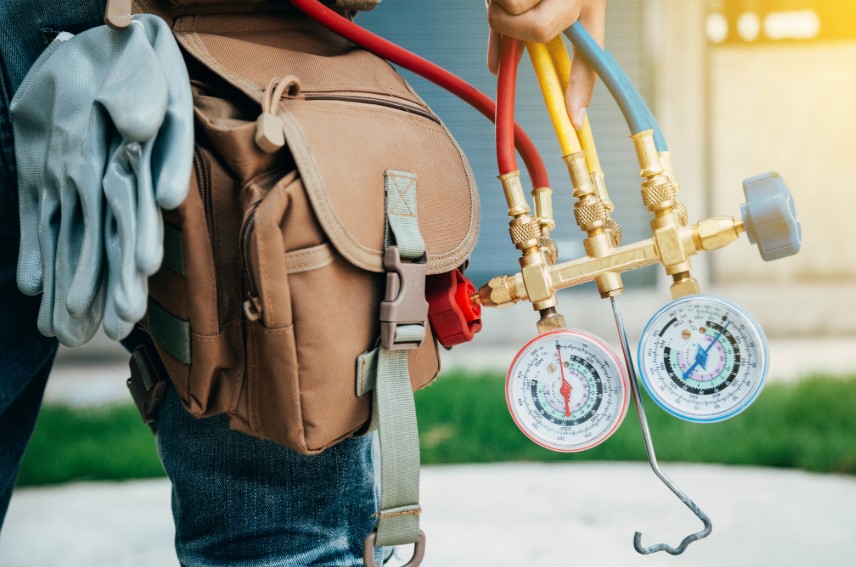
One of the first signs to look out for is a decrease in cooling efficiency. If you notice that your air conditioner is struggling to keep your home at a comfortable temperature or that it takes longer than usual to cool down, this could be a red flag for a coolant leak. This reduction in cooling power can also lead to increased energy consumption and higher electricity bills.
Altered operating pressures is another symptom of a coolant leak that is impossible to pinpoint without specialized equipment. When there is a leak in the system, the operating pressures may be affected, causing fluctuations in temperature and pressure. This can result in your HVAC unit running more frequently or cycling on and off rapidly, leading to uneven cooling and increased wear and tear on the system.
In addition to changes in cooling efficiency and operating pressures, there are other signs that may indicate a coolant leak. These include visible moisture or pooling around the unit, strange noises coming from the system, and a noticeable decrease in air flow. If you notice any of these signs, it is important to have your HVAC system inspected by a professional as soon as possible.
Steps to Address a Coolant Leak
If you suspect that your HVAC system has a coolant leak, it is important to address the issue promptly. Here are some steps you can follow to handle a coolant leak:
Turn off your air conditioner
The first step in addressing a coolant leak is to turn off your air conditioner. This will prevent any further damage to the system and reduce the risk of injury or electrocution. It is important to note that if you have a central air conditioning unit, you may need to turn off the power at the circuit breaker as well.
Plus, by turning off your air conditioner, you can prevent any more coolant from leaking out and potentially causing more damage to the system or your home. This will also give you a chance to assess the situation without any additional pressure or airflow.
Locate the leak
Once your air conditioner is turned off, it is time to locate the source of the leak. This may require some investigation and inspection of the unit. You can start by visually inspecting the area around your air conditioning unit for any signs of moisture or pooling coolant.
If you are unable to locate the leak on your own, contact Beachwood Air to send out a professional HVAC technician who has experience in handling coolant leaks. We have the necessary tools and knowledge to accurately pinpoint the source of the leak.
Clean the area around the leak
Before attempting to repair or replace any damaged components, it is important to clean the area around the leak. This will help you get a better look at the extent of the damage and ensure that there are no other issues that need to be addressed.
You can use a cloth or paper towels to wipe away any excess coolant and dirt from the surrounding area. Make sure to dispose of any contaminated materials properly, as coolant can be harmful to both humans and the environment.
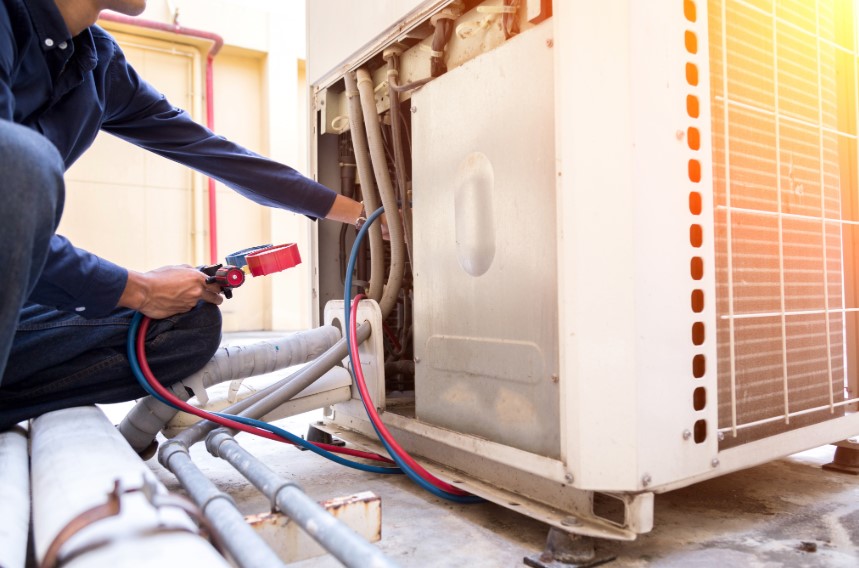
Repair or replace damaged components
Once the area is cleaned and the leak is located, you can begin repairing or replacing any damaged components. This may include replacing a damaged hose, tightening loose connections, or applying sealant to small cracks.
If the leak is coming from a major component such as the condenser or evaporator coils, it is best to leave the repair to a professional. Attempting to fix these components on your own can be dangerous and may result in further damage to your air conditioning unit.
Refill the coolant
After all necessary repairs are made, refill the coolant in your air conditioning unit. This will ensure that your unit can continue to operate efficiently and effectively. This should only be done by a trained professional as it requires specialized equipment and knowledge.
Adding too much or too little coolant can also cause problems with your unit, so it is important to have a professional handle this task. We will also be able to check for any additional leaks or other issues that may be causing the coolant to run low.
Be sure to follow the manufacturer’s instructions and use the recommended coolant for your specific unit. Using the wrong type of coolant can cause damage to your system and potentially void any warranties.
Turn your air conditioner back on and monitor for any further issues
Once the air conditioner repairs and coolant refill have been completed, you can turn your air conditioning unit back on. Monitor the unit for any further issues or leaks.
If you notice any unusual sounds or smells coming from your unit, it may be a sign of another problem. In this case, it is best to contact a professional for further assistance. Regularly check and replace your air filters to ensure that your unit is running efficiently. This can also help prevent any future issues with your air conditioner. Schedule regular maintenance appointments with a professional to keep your air conditioning unit in top condition.
Advanced Leak Detection Techniques
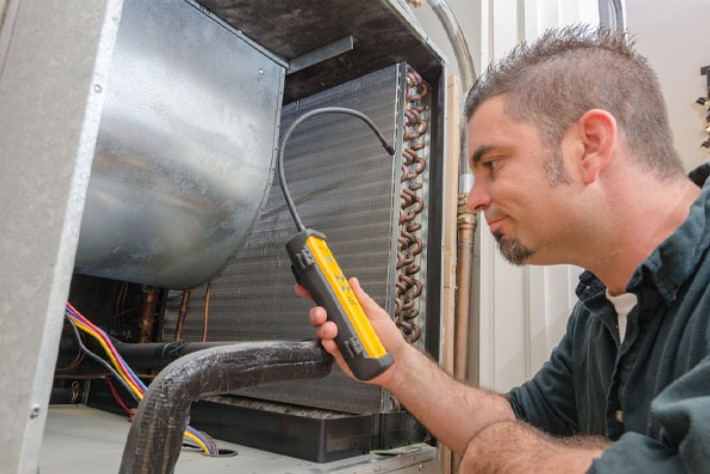
At Beachwood Air, we pride ourselves on using cutting-edge technology to diagnose and repair HVAC systems. One of our most valuable tools is our state-of-the-art electronic leak detector. This advanced equipment allows us to quickly and accurately locate leaks in HVAC systems, saving time and money for both our technicians and customers.
The comparison between modern electronic detection methods and traditional techniques such as bubble spray and dye tests is like night and day. While these older methods may have been effective in the past, they are no match for the efficiency and precision of an electronic leak detector.
Instead of relying on visual cues, our electronic detector uses highly sensitive sensors to detect even the smallest leaks in the system. This means that our technicians can locate leaks with greater accuracy and in a fraction of the time it would take using traditional methods.
What are the specific benefits of using an electronic leak detector for HVAC diagnostics?
It saves time. With traditional techniques, multiple visits may be required to accurately locate a leak. However, with an electronic detector, our technicians can pinpoint the leak on their first visit, saving both time and inconvenience for our customers.
Electronic leak detection also saves money. By accurately locating leaks, our technicians can make targeted repairs instead of guessing and potentially causing further damage to the system. This ultimately leads to cost savings for our customers.
Contact us today to schedule an appointment and experience the benefits of our state-of-the-art electronic leak detector for yourself.
Mistakes that can be avoided with electronic Coolant Leak detection
There are several common mistakes that can be avoided with the use of modern electronic detection methods for HVAC diagnostics. Some of these include:
- Inaccurate leak location: Traditional techniques rely on visual cues, which may not always accurately pinpoint the exact location of a leak. This can result in multiple visits and repairs, leading to added costs and inconvenience.
- Wasting time and resources: Without the use of electronic detectors, technicians may have to spend hours manually checking for leaks, leading to wasted time and resources.
- Damage to the system: Guessing the location of a leak can lead to unnecessary damage to the HVAC system during repairs. This can result in higher repair costs and longer downtime for the system.
- Inconvenience for customers: Multiple visits for leak detection and repairs can be inconvenient for customers, especially if it disrupts their daily routine or business operations.
By using modern electronic detection methods, these mistakes can be avoided, leading to a more efficient and cost-effective HVAC service experience.
Electronic leak detection is a game-changer in the HVAC industry
It offers numerous benefits such as cost savings, time efficiency, and accuracy compared to traditional methods. By investing in this technology, HVAC companies can provide better service to their customers and improve overall operations.
If you suspect a leak in your HVAC system, remember the benefits of electronic detection and choose a company that offers this modern solution for a hassle-free experience. Contact us today to schedule an appointment for electronic leak detection and experience the difference for yourself.
Think your aC is leaking freon? Call (732) 231-5857 or Contact Us Now to schedule your New Jersey HVAC Spring Tune-Up
FAQs
Is electronic leak detection more expensive than traditional methods?
No, using modern electronic detection methods can actually lead to cost savings for customers in the long run. This is because it accurately locates leaks, reducing the need for multiple repairs and potential damage to the system.
Can electronic leak detectors be used for all types of HVAC systems?
Yes, our state-of-the-art electronic leak detector is designed to work with all types of HVAC systems, including residential and commercial systems.
How does electronic leak detection work?
Electronic leak detectors use various techniques such as ultrasonic sound waves, infrared imaging, and gas sensors to detect leaks in HVAC systems. These methods are highly precise and can pinpoint the exact location of a leak, making repairs faster and more efficient.


